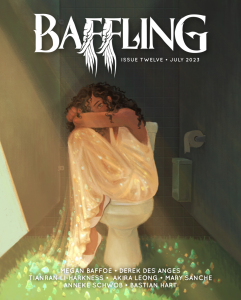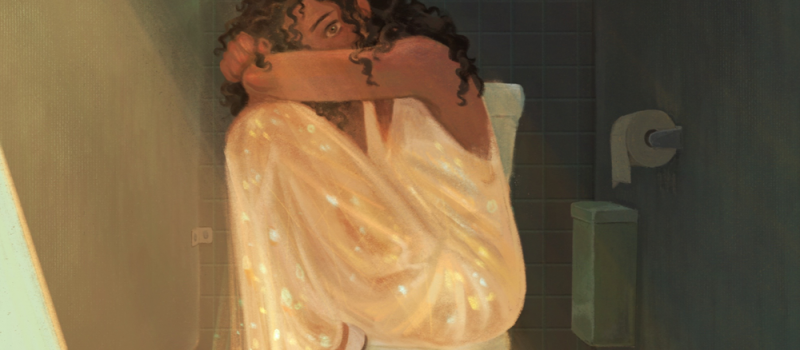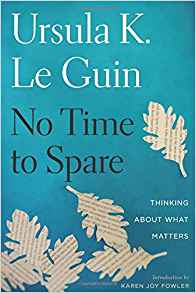Charles Payseur Reviews Short Fiction: Strange Horizons, Beneath Ceaseless Skies, Baffling, and Kaleidotrope
 Strange Horizons 6/19/23, 7/3/23, 7/10/23, 7/17/23
Strange Horizons 6/19/23, 7/3/23, 7/10/23, 7/17/23
Beneath Ceaseless Skies 6/29/23, 7/13/23
Baffling 7/23
Kaleidotrope 7/23
Samovar’s sibling publication, Strange Horizons, opens July with, among other, C. H. Lindsay’s poem “The Legacy of Granny Van Helsing”. The piece fleshes out a bit more of the family tree of the famous vampire hunter, revealing a rich line of people who know how to keep evil at bay through herb and through lore, all with a more matrilineal leaning. So while it might be the elderly professor most readers are familiar with, it’s almost undoubtedly at his grandmother’s knee that he heard the stories of vampires and learned the many ways to protect against them. Lindsay does clever work in expanding on the source material in an insightful way. In prose, Rabbit Sullivan’s “Moondog” occupies a place straddling captivating and devastating as it finds two people stranded on the moon, the rest of their crew and friends dead following a terrible accident. The survivors live, but carry their own damage from what has happened, and the narrator takes out some of their frustration and pain on the local population of moon dogs, airy creatures who they lure in and kill, much to the disgust of the other survivor. Sullivan exerts a subtle control on revealing information to the reader, adding context and depth to the story as the full and tragic circumstances come out. It’s heartbreaking, but the story also finds the survivors finally beginning to break through the walls of their shared and individual traumas, to cope and maybe to look forward and even heal and recover. It’s a haunting and beautiful story. Just when I was starting to feel that I was tired of responses to Ursula K. Le Guin’s foundational “The Ones Who Walk Away from Omelas”, Cynthia Gómez reminded me that there’s still rich material to mine from that vein with “The Ones Who Come Back to Heal”. In it, Seda is a healer who was one of those who walked away, though three years after they were shown the truth of their home city. The time since has been difficult, for them and for Omelas, and thirty years on they have come back to find the former regime toppled and the new scapegoat child who was “ensuring the prosperity” of so many free… but deeply traumatized. It’s their job to try and heal that child, but trust is a difficult thing to build, and what healing might look like is complicated by the child’s neurodivergence and the preconceptions many have to what healing and health even look like. On top of that are the layers of guilt, history, and family that Seda finds waiting for them, and that they must confront to attempt to heal their own wounds as well. Gómez crafts a stunning response to Le Guin’s classic story, one that stands on its own but shines most in the full context of what it engages with.
Beneath Ceaseless Skies’s final issue of June deals with teachers and students, and the prejudices and egos that make teaching and being taught a complex and thorny issue. And in the first issue of July, the focus shifts to larger conflicts, terrible monsters, and people doing their best to survive when completely out of their depths. As in Thomas M. Waldroon’s epic novella “That We Maye with Free Heartes Accomplishe Those Thynges”. Unfolding both in London and on a ship headed for the American colonies, the story centers Ben, a laborer and gay man trying to survive the hard streets of the big city. From a rough childhood and adolescence, Ben has finally found something of a space for himself, in the rooms of a molly house and in the company of his new lover. But the streets of London are far from safe, and the story finds Ben and his friends hounded by police, corruption, and strange foglike gray men who seem to be spreading and feeding on memories and desires. Waldroon does a fantastic job blending the well-researched historical London with a twisting plot and a wonderful ensemble of characters. There is a dreamlike quality that pervades and bridges the action in this distant past to the struggles and movements still active and vital today.
I’m always excited for a new issue of Baffling, and the July issue is full of great works, including Megan Baffoe’s magic-touched slice of life “Evergreen”. In it, forest witch Dahlia finds herself fallen for hunter Cyrene despite their differences, and contemplating what to put into the concoction that will dye her wedding clothes. Baffoe practices a careful hand in drawing the characters together through their unusual and unlikely courtship, and I love the warmth that rises from the prose, that shines as Dahlia embraces that it is the ways they frustrate and challenge each other that often shows just how strongly and deeply their love extends. It’s a beautiful work. A focus on the green and growing follows through into Derek Des Anges’s “Grown Gown”, which finds Maggie wearing an eco-friendly dress to a premiere in the hopes of showing that fashion can be ecologically responsible as well. Things aren’t exactly going well, though, as Maggie isn’t comfortable as a living billboard for her work and begins to learn that her boss might have taken some shortcuts in rushing the gown to completion. The story mixes anxiety, exploitation, and a helpful but possibly hallucinogenic dress into a statement on work, self-worth, and the shallowness of some forms of capitalist “green” science.
July’s Kaleidotrope shows a wide range of genres, tones, and styles, including “Disparate Points in Space and Time” by Maxine Sophia Wolff, a strange piece that follows a young trans man in the 1300s and a pair of revolutionaries in the distant future. Their stories are defined and linked by moments of resonance that beat a rhythm through time itself, through the characters and out into the world. This beat, this connect, allows them to see themselves and know themselves even when no one else around them does, and gives them a strength to move against a seemingly unstoppable current. Wolff shows the importance of connection, of being part of something that is often suppressed and erased, but which has been present since the earliest humans, and that no amount of hate can fully erase. It’s a beautiful read. In Lauren O’Brien’s “Death Cannot Unmake Us”, a death priestess and her partner are seen as intruders into the afterlife of a haunting spirit at an old house. Tasked with cleansing the house of its lingering inhabitants, the real story about the spirits present reveals the ways that obligation and resentment can at as a kind of poison, turning joy into venom, life into knotted death. O’Brien keeps the mood tense and shows how some partnerships should dissolve rather than dragging everyone involved into a twisted prison. The issue closes on Kurt Newton’s poem “Flora”, which focuses on the way that people think about nature. Often portrayed as nurturing and kind, the truth of nature is much more often uncaring, powerful, and deadly. And yet people persist in trying to imagine nature as safe, as protecting, and the poem explores that, casting this impulse as a kind of narrative control, a willing and wanting of nature to be a loving mother instead of a vast and unsentimental system in which people are just one part.
Recommended Stories
“Moondog”, Rabbit Sullivan (Strange Horizons 7/23)
“Evergreen”, Megan Baffoe (Baffling 7/23)
“Disparate Points in Space and Time”, Maxine Sophia Wolff (Kaleidotrope 7/23)
Charles Payseur is an avid reader, writer, and reviewer of speculative fiction. His works have appeared in The Best American Science Fiction and Fantasy, Lightspeed Magazine, and Beneath Ceaseless Skies, among others, and many are included in his debut collection, The Burning Day and Other Strange Stories (Lethe Press 2021). He is the series editor of We’re Here: The Best Queer Speculative Fiction (Neon Hemlock Press) and a multiple-time Hugo and Ignyte Award finalist for his work at Quick Sip Reviews. When not drunkenly discussing Goosebumps, X-Men comic books, and his cats on his Patreon (/quicksipreviews) and Twitter (@ClowderofTwo), he can probably found raising a beer with his husband, Matt, in their home in Eau Claire, Wisconsin.
This review and more like it in the September 2023 issue of Locus.
 While you are here, please take a moment to support Locus with a one-time or recurring donation. We rely on reader donations to keep the magazine and site going, and would like to keep the site paywall free, but WE NEED YOUR FINANCIAL SUPPORT to continue quality coverage of the science fiction and fantasy field.
While you are here, please take a moment to support Locus with a one-time or recurring donation. We rely on reader donations to keep the magazine and site going, and would like to keep the site paywall free, but WE NEED YOUR FINANCIAL SUPPORT to continue quality coverage of the science fiction and fantasy field.
©Locus Magazine. Copyrighted material may not be republished without permission of LSFF.








